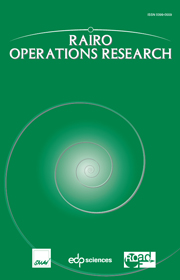Article contents
Entropy maximization and the busy period of some single-server vacation models
Published online by Cambridge University Press: 15 September 2004
Abstract
In this paper, information theoretic methodology forsystem modeling is applied to investigate the probability density functionof the busy period in M/G/1 vacation models operating under the N-, T- andD-policies. The information about the density function is limited to a fewmean value constraints (usually the first moments). By using the maximumentropy methodology one obtains the least biased probability densityfunction satisfying the system's constraints. The analysis of the threecontrollable M/G/1 queueing models provides a parallel numerical study ofthe solution obtained via the maximum entropy approach versus “classical”solutions. The maximum entropy analysis of a continuous system descriptor(like the busy period) enriches the current body of literature which, inmost cases, reduces to discrete queueing measures (such as the number ofcustomers in the system).
- Type
- Research Article
- Information
- Copyright
- © EDP Sciences, 2004
References
- 9
- Cited by


